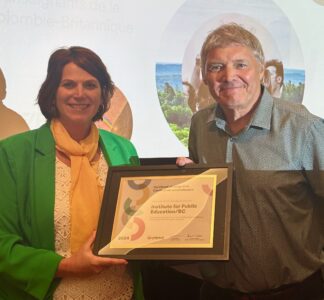Decolonizing Dialogues; The auto-pedagogical potential of encounters with Indigenous art
By Shannon Leddy
March 28, 2024
Indigenous education has emerged in recent decades as one of the key priorities in both curricular reform and educational policy in Canada. Many teachers, particularly those who have completed their teacher education in the years since Indigenous education courses have become a required part of curriculum, have taken up this challenge in earnest and relationally ethical ways, feeling increasingly confident in their ability to navigate the emotional labour this work often involves. But there are probably just as many who still feel unsure about their knowledge base in Indigenous histories, knowledges and pedagogies. And still there are a few who are resistant to these shifts in curricular priorities and the learning required to undertake them (Leddy& O’Neill, 2021).
The words decolonization, reconciliation and Indigenization get a lot of air time in educational discourses these days, but many of us still struggle to understand what these words mean in the context of our daily work. We all stand at different places on the spectrums of Indigenous learning and relationships, and sometimes it feels hard to find the middle path and the common ground. Through this writing, I hope to shed some light on the value of encounters with Indigenous art as a mechanism to help move us along in the learning journey engaging in Indigenous education requires us to take.
 There have been many prominent Indigenous scholars of educational discourses over the past number of years who have made clear the need for changes in the way mainstream educational practices and curriculum include and address Indigenous students, their cultures and histories within schools (Battiste, 2004; Dion, 2008; Donald, 2009; Schick & St. Denis, 2004; St. Denis, 2011). They point to the fact that colonial logics and agendas have excluded, reduced, distorted and erased Indigenous cultures, languages and knowledges in curriculum for decades. This is important when we think about the many Canadians who have become teachers having risen through the very systems of education that were perpetuating ignorance and misunderstanding. Indeed, in my early days of teaching Indigenous education to pre-service teachers, many expressed anger and dismay when it became clear to them what was intentionally not taught to them in schools.
There have been many prominent Indigenous scholars of educational discourses over the past number of years who have made clear the need for changes in the way mainstream educational practices and curriculum include and address Indigenous students, their cultures and histories within schools (Battiste, 2004; Dion, 2008; Donald, 2009; Schick & St. Denis, 2004; St. Denis, 2011). They point to the fact that colonial logics and agendas have excluded, reduced, distorted and erased Indigenous cultures, languages and knowledges in curriculum for decades. This is important when we think about the many Canadians who have become teachers having risen through the very systems of education that were perpetuating ignorance and misunderstanding. Indeed, in my early days of teaching Indigenous education to pre-service teachers, many expressed anger and dismay when it became clear to them what was intentionally not taught to them in schools.
But here is where I have found my long-time passion for both creating and teaching about and through art. to be of significant benefit. I have witnessed the power of art to help me teach in ways that call my students in, rather than calling them out. Art, as noted by Dewey (1934) and Greene (2000), has the power to help us transcend our own consciousness as we encounter the reality of another, presented through their manifestation of ideas into art. This is particularly relevant when it comes to encounters with works by Indigenous and other BPOC artists. Indigenous writers and thinkers have also offered ample evidence of the power of Indigenous visual expression to transmit culture, teachings and values (Cajete, 1994; Reid, 2012), making them rich sources with which to dwell and reflect.
In the work that I do in teacher education, I rely heavily on the power of art to spark insight and transformative understandings in my students, using a set of guiding questions (what am I looking at, what does it remind me of, what do I like about it, what do I dislike, and what do I need to learn), and offer them ample time to dwell with each work to which I introduce them. Importantly, this is also done with the caveat that there are no wrong answers – we each bring who we are to these encounters and our responses are our own and legitimate in their own right (Leddy, 2014; Leddy & O’Neill, 2021). We view works by artists such as Ruth Cuthand, Brian Jungen, Skeena Reece, Kent Monkman, Rebecca Belmore, and Lawrence Paul Yuxweluptun, each of whom brings their own talents, concerns and thematic tropes to the fore in the art they create.
For my students, these encounters with art can bring a range of emotional responses from dismay, anger, rage, and shame, to elation, connection, relief and clarity. For some, these encounters validate their own identities. For others, their identity, particularly as Canadians, is challenged, upended, and problematized in unexpected ways. But when we do this work together, when we have the courage to share our responses and thoughts in this process, even those who are most uncomfortable often find support in their learning, and inspiration in the insights of their classmates (Leddy, 2023).
responses and thoughts in this process, even those who are most uncomfortable often find support in their learning, and inspiration in the insights of their classmates (Leddy, 2023).
To be clear, these encounters with art do not need to occur only the my classroom, or in an art gallery. Plays, novels, films, music, poetry and dance can all open the same windows of discovery. The point is, we need opportunities to encounter them; to learn whose work we are drawn to, and to spend time considering how we feel during our encounters. Art, in nearly all of its forms, has the power to show us what we thought we knew, reveal to us what we don’t know, and point us in the direction of the relearning we need to do. Further, these counters are not only suitable for post-secondary contexts – this work can be done in any classroom, with students of all ages and does not require the teacher to be completely fluent in the process. We are never too old to co-learn with our students, and may we always remain humble enough to do so.
There are so many more elements of this work I would be happy to share, including connections to other curricular areas and to land-based, experiential and holistic pedagogies as well. My passion for Indigenous education never seems to fade because I know how important it is to Indigenous families, including my own. I know how important it is for Indigenous students to see themselves reflected in the curricular  resources to which they are exposed. But the best part is that Indigenous approaches to education demonstrably benefit all of our students, making the work of decolonizing and Indigenizing all the more pertinent and pressing (Restoule, 2017). When we teach with attention to Kirkness’s 4Rs of Indigenous education, respect, reciprocity, relevance, and responsibility, then we model what it means to build and maintain good relationships with ourselves, others, and what we must all learn together. When we use holistic frameworks, such as the Medicine Wheel, in our pedagogical and planning considerations, we can plan lessons and learning experiences that address our students as the intellectual, spiritual, emotional and physical beings that they are. And when we undertake to do the work of decolonizing ourselves, we become better at preparing our students for the world they will inherit, putting the Eurocentric practices of the past behind us where they belong.
resources to which they are exposed. But the best part is that Indigenous approaches to education demonstrably benefit all of our students, making the work of decolonizing and Indigenizing all the more pertinent and pressing (Restoule, 2017). When we teach with attention to Kirkness’s 4Rs of Indigenous education, respect, reciprocity, relevance, and responsibility, then we model what it means to build and maintain good relationships with ourselves, others, and what we must all learn together. When we use holistic frameworks, such as the Medicine Wheel, in our pedagogical and planning considerations, we can plan lessons and learning experiences that address our students as the intellectual, spiritual, emotional and physical beings that they are. And when we undertake to do the work of decolonizing ourselves, we become better at preparing our students for the world they will inherit, putting the Eurocentric practices of the past behind us where they belong.
References
Battiste, M. (2009). Naturalizing Indigenous knowledge in Eurocentric education. Canadian Journal of Native Education, 32(1).
Cajete, G. (1994). Look to the mountain: An ecology of indigenous education. Kivaki Press.
Dewey, J. (1934). Art as experience. Perigree Press.
Dion, S. (2007). Disrupting moulded images: Identities, responsibilities and relationships – teachers and Indigenous subject material. Teaching Education, 18(4), 329-342. (Available through UBC Library)
Donald, D. (2009). Forts, curriculum, and Indigenous Métissage: Imagining decolonization of Aboriginal-Canadian relations in educational contexts. First Nations Perspectives, 2 (1), 1-24.
Greene, M. (2000). Releasing the imagination: Essays on education, the arts, and social change. John Wiley & Sons.
Leddy, S. (2014). Using art to open postcolonial dialogues with pre-service teachers. SFU Educational Review, 7.
Leddy, S. (2023). Indigenous Visual Expression as Pedagogy; Developing Decolonial Literacy through Dialogic Encounters with Indigenous Art. Relate North. 36. InSEA Publications.
Leddy, S., & O’Neill, S. (2021). It’s Not Just a Matter of Time: Exploring Resistance to Indigenous Education. Alberta Journal of Educational Research, 67(4), 336-350
Reid, M. J. (Ed.). (2012). Carrying on” Irregardless”: Humour in Contemporary Northwest Coast Art. Bill Reid Gallery of Northwest Coast Art.
Restoule, J. P. Chaw-win-is (2017). Old ways are the new way forward. How Indigenous pedagogy can benefit everyone. The Canadian Commission for UNESCO’s IdeaLab, 1-18.
Schick, C., & St. Denis, V. (2005). Troubling national discourses in anti-racist curricular planning. Canadian Journal of Education/Revue canadienne de l’éducation, 295-317.
St. Denis, V. (2011). Silencing Aboriginal curricular content and perspectives through multiculturalism: “There are other children here”. Review of education, pedagogy, and cultural studies, 33(4), 306-317.
Shannon Leddy (Métis ) is a Vancouver based teacher, writer, Associate Professor in the Department of Curriculum and Pedagogy, Faculty of Education, UBC and IPE/BC Fellow. She has also worked as an instructor at SFU’s Faculty of Education, teaching courses in pedagogy and Aboriginal Education. Shannon is committed to finding new and meaningful ways to incorporate Indigenous content into the school curriculum and is particularly interested in engaging pre-service teachers with Indigenous art as a way of decolonizing education.
 that provincial law meant that fees could not be charged. The court case was successful in 2006.
that provincial law meant that fees could not be charged. The court case was successful in 2006. “shall consult with appropriate teachers, staff, staff committee, students and the Parents’ Advisory Council prior to establish the fee.” Do you recall that consultation last school year?
“shall consult with appropriate teachers, staff, staff committee, students and the Parents’ Advisory Council prior to establish the fee.” Do you recall that consultation last school year? financial hardship and how the waiver can be obtained. The policy is supposed to be fair, consistent and confidential. You can find how your district provides this in the district policy or ask the school principal.
financial hardship and how the waiver can be obtained. The policy is supposed to be fair, consistent and confidential. You can find how your district provides this in the district policy or ask the school principal. The NATO-induced commitment is not something prescribed by law. Nor is it a treaty commitment. It is a political deal hashed out within a supranational military organization that hasn’t been elected by anyone. It is very telling that when the Prime Minister announced his recent 2% timetable, it was not done in parliament, or even within Canada – it was done in a European forum in front of politicians, bureaucrats, generals and defense pundits – and covered by a mainstream media that increasingly functions as echo chamber for military-industrial interests. This is the group calling the defense spending shots and the group Canada has decided to answer to.
The NATO-induced commitment is not something prescribed by law. Nor is it a treaty commitment. It is a political deal hashed out within a supranational military organization that hasn’t been elected by anyone. It is very telling that when the Prime Minister announced his recent 2% timetable, it was not done in parliament, or even within Canada – it was done in a European forum in front of politicians, bureaucrats, generals and defense pundits – and covered by a mainstream media that increasingly functions as echo chamber for military-industrial interests. This is the group calling the defense spending shots and the group Canada has decided to answer to.
 resource shortage and funding insecurity?
resource shortage and funding insecurity? IPE/BC Chairperson, Steve Cardwell accepted the award on behalf of the Board at the CTF-FCE Annual General Meeting which was held in Vancouver this year. In his address to the meeting, Steve had this to say:
IPE/BC Chairperson, Steve Cardwell accepted the award on behalf of the Board at the CTF-FCE Annual General Meeting which was held in Vancouver this year. In his address to the meeting, Steve had this to say: As the IPE quoted UNICEF Canada in our
As the IPE quoted UNICEF Canada in our 
 Having good food available at school would reduce busy families’ financial and time pressures, expose kids to a wide range of healthy foods, remove the stigma of current food programs that are targeted only to kids from poor families and support local food production.
Having good food available at school would reduce busy families’ financial and time pressures, expose kids to a wide range of healthy foods, remove the stigma of current food programs that are targeted only to kids from poor families and support local food production. There have been many prominent Indigenous scholars of educational discourses over the past number of years who have made clear the need for changes in the way mainstream educational practices and curriculum include and address Indigenous students, their cultures and histories within schools (Battiste, 2004; Dion, 2008; Donald, 2009; Schick & St. Denis, 2004; St. Denis, 2011). They point to the fact that colonial logics and agendas have excluded, reduced, distorted and erased Indigenous cultures, languages and knowledges in curriculum for decades. This is important when we think about the many Canadians who have become teachers having risen through the very systems of education that were perpetuating ignorance and misunderstanding. Indeed, in my early days of teaching Indigenous education to pre-service teachers, many expressed anger and dismay when it became clear to them what was intentionally not taught to them in schools.
There have been many prominent Indigenous scholars of educational discourses over the past number of years who have made clear the need for changes in the way mainstream educational practices and curriculum include and address Indigenous students, their cultures and histories within schools (Battiste, 2004; Dion, 2008; Donald, 2009; Schick & St. Denis, 2004; St. Denis, 2011). They point to the fact that colonial logics and agendas have excluded, reduced, distorted and erased Indigenous cultures, languages and knowledges in curriculum for decades. This is important when we think about the many Canadians who have become teachers having risen through the very systems of education that were perpetuating ignorance and misunderstanding. Indeed, in my early days of teaching Indigenous education to pre-service teachers, many expressed anger and dismay when it became clear to them what was intentionally not taught to them in schools. responses and thoughts in this process, even those who are most uncomfortable often find support in their learning, and inspiration in the insights of their classmates (Leddy, 2023).
responses and thoughts in this process, even those who are most uncomfortable often find support in their learning, and inspiration in the insights of their classmates (Leddy, 2023). resources to which they are exposed. But the best part is that Indigenous approaches to education demonstrably benefit all of our students, making the work of decolonizing and Indigenizing all the more pertinent and pressing (Restoule, 2017). When we teach with attention to Kirkness’s 4Rs of Indigenous education, respect, reciprocity, relevance, and responsibility, then we model what it means to build and maintain good relationships with ourselves, others, and what we must all learn together. When we use holistic frameworks, such as the Medicine Wheel, in our pedagogical and planning considerations, we can plan lessons and learning experiences that address our students as the intellectual, spiritual, emotional and physical beings that they are. And when we undertake to do the work of decolonizing ourselves, we become better at preparing our students for the world they will inherit, putting the Eurocentric practices of the past behind us where they belong.
resources to which they are exposed. But the best part is that Indigenous approaches to education demonstrably benefit all of our students, making the work of decolonizing and Indigenizing all the more pertinent and pressing (Restoule, 2017). When we teach with attention to Kirkness’s 4Rs of Indigenous education, respect, reciprocity, relevance, and responsibility, then we model what it means to build and maintain good relationships with ourselves, others, and what we must all learn together. When we use holistic frameworks, such as the Medicine Wheel, in our pedagogical and planning considerations, we can plan lessons and learning experiences that address our students as the intellectual, spiritual, emotional and physical beings that they are. And when we undertake to do the work of decolonizing ourselves, we become better at preparing our students for the world they will inherit, putting the Eurocentric practices of the past behind us where they belong. The bigger problem here comes down to the teacher increment ladder. Educators are underpaid for the nine to ten years it takes to reach full salary – the regular rate for the job. This encourages implementation of an extractivist approach to the use of educator labour. Extractivism is a concept developed by David Harvey, Veronica Gago, Nancy Fraser and others to describe power relationships which afford those in control the ability to confiscate or extract rising shares of value from their subordinates.
The bigger problem here comes down to the teacher increment ladder. Educators are underpaid for the nine to ten years it takes to reach full salary – the regular rate for the job. This encourages implementation of an extractivist approach to the use of educator labour. Extractivism is a concept developed by David Harvey, Veronica Gago, Nancy Fraser and others to describe power relationships which afford those in control the ability to confiscate or extract rising shares of value from their subordinates. which allow for the migration to other areas of work. Less stress? Better pay? Reduced feeling that your commitment to work is being used against you? Hey, why not make that move?
which allow for the migration to other areas of work. Less stress? Better pay? Reduced feeling that your commitment to work is being used against you? Hey, why not make that move? It’s time to think “outside the box” and look for innovative ideas to deal with a problem that is likely only to get worse. We can all support the call for more funding resources for public education but there is also a need to look at practical options for making better use of whatever resources are provided to support public schooling.
It’s time to think “outside the box” and look for innovative ideas to deal with a problem that is likely only to get worse. We can all support the call for more funding resources for public education but there is also a need to look at practical options for making better use of whatever resources are provided to support public schooling.